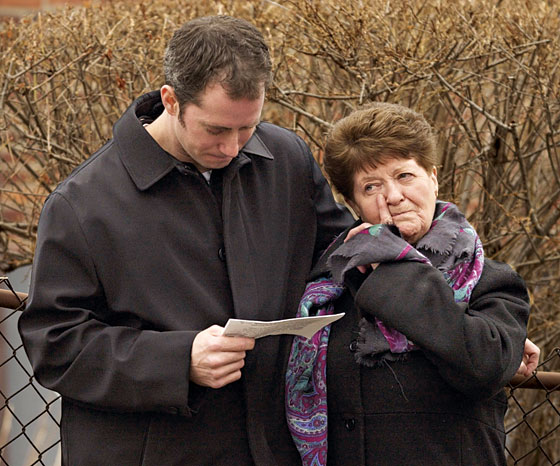 |
(Photo: John Bohn/the Boston Globe via Getty Images) |
Ninety-six families declined to apply for the Victim Compensation Fund and pressed ahead with lawsuits against United and American Airlines.
That fund, which would ultimately deliver $7 billion in awards to 5,560 applicants [H2], was doing more than delivering tax-free largesse to the families of 9/11 victims. It was also executing a government policy to shield from legal consequence two corporations that had failed to protect hundreds of their paying customers from being incinerated by suicidal maniacs. It was an unprecedented role for Kenneth Feinberg, the special master of the fund: He had to persuade thousands of angry, grief-stricken families to accept a sum that he himself would determine in exchange for waiving their right to sue United Airlines or American Airlines, the Port Authority, the architects of the World Trade Center, the United States government, the city of New York, or any other domestic entity.
The motives of the 96 families who refused a payout varied. Some were seeking larger settlements than the compensation fund was likely to offer them; Feinberg had assigned the arbitrary limit of $250,000 for each victim, plus $100,000 per dependent, for noneconomic damage, and the statute required that life insurance be deducted from the final payout. But many who sued hoped to use the litigation process to compel disclosure of a fuller picture of what the airlines did—and left undone—on 9/11 and in the days, weeks, months, and years leading up to it.
It was the claim of these plaintiff families that, as their attorney Don Migliori, from the firm Motley Rice, put it, “every single flight had unequivocal evidence that 9/11 was preventable at the checkpoints.” The goal was to place United Airlines employees on the stand under oath in a public courtroom to answer uncomfortable questions that the plaintiffs felt that the 9/11 Commission had neglected to pose. Nearly half of the people Motley Rice’s investigators deposed had never been questioned by any arm of the federal government, Migliori told me. One of the airport screeners required an English translator.
Throughout the legal mediation process that followed, Sheila L. Birnbaum, the court-appointed mediator, argued that litigation was not a good way to find the truth. “We get two stories, usually, at a trial, and the jury picks between the two,” she said, speaking in a Skadden, Arps conference room overlooking Times Square. “But that doesn’t mean we ever get to truth.” She also argued that settling would help families reach closure. “As long as this case was alive, they were not going to be able to move on.”
Ninety-five of the families accepted that logic and settled with the airlines, for a total of $500 million. But one family still plans to take its claim against United Airlines to trial. Mark Bavis died on United Flight 175 on 9/11, and his family is determined to see the case through to the end. Their aim, said Mark’s twin brother, Mike, is not money but accountability. The Bavises want to force a public reckoning that they feel, ten years after 9/11, has been denied them and the other victims’ families by both the airlines and the federal government. “We have a right to know everything that happened and why. We never even considered for one second settling for anything other than a full airing of the facts,” Mike said.
“A lot of people can very casually comment to me that people should move on or need to move on,” he continued. “My reply to them is that people should also do the right thing. If the airlines want to do the right thing, and acknowledge all the facts, then we’ll move on.”
They are scheduled to go to trial in November.
